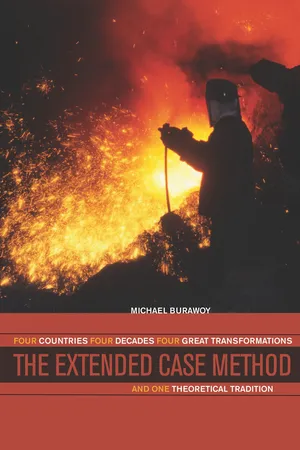
eBook - PDF
The Extended Case Method
Four Countries, Four Decades, Four Great Transformations, and One Theoretical Tradition
- 360 pages
- English
- PDF
- Available on iOS & Android
eBook - PDF
The Extended Case Method
Four Countries, Four Decades, Four Great Transformations, and One Theoretical Tradition
About this book
In this remarkable collection of essays, Michael Burawoy develops the extended case method by connecting his own experiences among workers of the world to the great transformations of the twentieth century—the rise and fall of the Soviet Union and its satellites, the reconstruction of U.S. capitalism, and the African transition to post-colonialism in Zambia. Burawoy's odyssey began in 1968 in the Zambian copper mines and proceeded to Chicago's South Side, where he worked as a machine operator and enjoyed a unique perspective on the stability of advanced capitalism. In the 1980s, this perspective was deepened by contrast with his work in diverse Hungarian factories. Surprised by the collapse of socialism in Hungary in 1989, he journeyed in 1991 to the Soviet Union, which by the end of the year had unexpectedly dissolved. He then spent the next decade studying how the working class survived the catastrophic collapse of the Soviet economy. These essays, presented with a perspective that has benefited from time and rich experience, offer ethnographers a theory and a method for developing novel understandings of epochal change.
Frequently asked questions
Yes, you can cancel anytime from the Subscription tab in your account settings on the Perlego website. Your subscription will stay active until the end of your current billing period. Learn how to cancel your subscription.
No, books cannot be downloaded as external files, such as PDFs, for use outside of Perlego. However, you can download books within the Perlego app for offline reading on mobile or tablet. Learn more here.
Perlego offers two plans: Essential and Complete
- Essential is ideal for learners and professionals who enjoy exploring a wide range of subjects. Access the Essential Library with 800,000+ trusted titles and best-sellers across business, personal growth, and the humanities. Includes unlimited reading time and Standard Read Aloud voice.
- Complete: Perfect for advanced learners and researchers needing full, unrestricted access. Unlock 1.4M+ books across hundreds of subjects, including academic and specialized titles. The Complete Plan also includes advanced features like Premium Read Aloud and Research Assistant.
We are an online textbook subscription service, where you can get access to an entire online library for less than the price of a single book per month. With over 1 million books across 1000+ topics, we’ve got you covered! Learn more here.
Look out for the read-aloud symbol on your next book to see if you can listen to it. The read-aloud tool reads text aloud for you, highlighting the text as it is being read. You can pause it, speed it up and slow it down. Learn more here.
Yes! You can use the Perlego app on both iOS or Android devices to read anytime, anywhere — even offline. Perfect for commutes or when you’re on the go.
Please note we cannot support devices running on iOS 13 and Android 7 or earlier. Learn more about using the app.
Please note we cannot support devices running on iOS 13 and Android 7 or earlier. Learn more about using the app.
Yes, you can access The Extended Case Method by Michael Burawoy in PDF and/or ePUB format, as well as other popular books in Ciencias sociales & Sociología. We have over one million books available in our catalogue for you to explore.
Information
Table of contents
- Cover
- Title
- Copyright
- Contents
- List of Tables
- Prologue: Bringing Theory to the Field
- Introduction: From Manchester to Berkeley
- 1. The Extended Case Method: Race and Class in Postcolonial Africa
- 2. The Ethnographic Revisit: Capitalism in Transition and Other Histories
- 3. Two Methods in Search of Revolution: Trotsky versus Skocpol
- 4. Multicase Ethnography: Tracking the Demise of State Socialism
- Conclusion: The Ethnography of Great Transformations
- Epilogue: On Public Ethnography
- Notes
- References
- Index